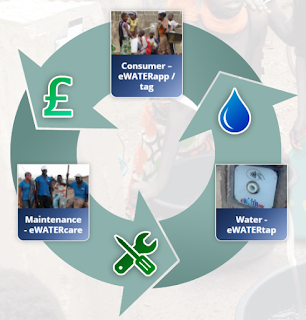Female farmers and irrigation
Being a woman in rural Africa is no easy task as I have
highlighted in my past blogs, however, in this blog I will be looking at the
female farmers of rural Africa and the struggles they face because of their
sex. Not having the same rights or opportunities as their male counterparts is
inevitably not only holding the women back but the development of the areas and
economies. Women have limited access to land, technologies and agricultural
extension thus disabling them from producing the same yield and results as men
do, yet women dominate the agricultural sector as 80% of women are in the
agricultural sector. On top of their household duties women are expected to
work in the fields, often with their young children either by their side or on
their backs. In this blog I will be focusing on the irrigation schemes in
Africa and the inequality female farmers’ face in regards to agricultural
irrigation.
In Tunisia we have
seen access to irrigated land under localized land reform, where new rights
were put into place to help people with low incomes. 50 hectares were
expropriated from private owners against compensation and was distributed to
small tenants and landless workers who had experience with irrigated farming.
These units were distributed in units of 5-10 hectares. Although this scheme is
a step in the right direction for inequalities within social classes, gender
inequalities still remain in some schemes. For example, the Wolof and Soninke
farm distribution in the Delta has proved to still show the gender
discriminations that remain. Although women obtained irrigable plots they were
only half the size of men’s thus limiting the amount of produce they can
produce and keeping their incomes considerable lower that men’s’. However, this
is not the case in all of Africa as the irrigable land distribution in
Nyandusi, Kenya prioritizes women and gives them priority allocation of land.
The organisation in charge of this scheme has worked alongside women’s groups
as well as former male land right holders to achieve this.
In general men have much better access to groundwater
irrigation than women, men are the head of the household and make the big
decisions, meaning women receive whatever they get, which is often a lot less
than men. Inheritance is another thing that women often do not receive, as the
land and money of the family will get passed to the son of the family, leaving
the women to get what they can on their own. The women who don’t gain access to
ground water irrigation schemes or any other technologies are forced to use
hand pumps, which the women must then carry the water to the farm to water the
land. This is a heavy stress on the body that is not necessary if only the
women had access to better technologies.
The technologies are available in Africa to help its
development of the rural areas. If investment and education was spread even on
a local community scale women will be able to develop there farming and income.
If they have an increased access to land and water, mainly groundwater
irrigation, they can help the local community grow and have a knock on effect
to surrounding areas.
References:
Quisumbing, A. R., & Pandolfelli, L.
(2009). Promising approaches to address the needs of poor female
farmers: Resources, constraints, and interventions. St. Louis: Federal
Reserve Bank of St Louis.
Allen, A., & A. A. Frediani. (2013). Farmers, not gardeners
The making of environmentally just spaces in Accra. City. 17 (3),
p365-381.
van Koppen, B. . (1998). Water rights, gender, and poverty
alleviation. Inclusion and exclusion of women and men smallholders in public
irrigation infrastructure development. Agriculture and Human Values.
15 (4), p361–374.
Diemer, G.
(1990). Irrigatie in Afrika. Boeren en ingenieurs, techniek en cultuur. PhD
Thesis. Amsterdam: Thesis Publishers.
Povel S. A.
M. T. (1990). “Participatory development of a Women’s Irrigation Scheme case:
The Nyandusi Women Horticultural Scheme Nyanza Province, Kenya,” Contribution
to the International Workshop “Design for Sustainable Farmer Managed Irrigation
Schemes in Sub-Saharan Africa” Department of Irrigation and Soil and Water
Conservation Wageningen Agricultural University.

This comment has been removed by the author.
ReplyDeleteHi! Interesting post here, well done! I wholeheartedly agree with you about the use of education to enable women to be able to develop their farming and income. However, I don't think you discussed the main problem with this - how feasible is this education, especially in rural areas? As I'm sure you know, this could be problematic to implement. Therefore, what do you think would be the best way to spread this investment and education? Also, new technologies are important (as you have said), so what do you think is the best way to introduce these new technologies?
ReplyDeleteHowever, this is a really interesting post that is rather different from my own topic so was an enjoyable read!
Hi! This is a very informative post! You have mentioned the importance of education and technologies in order to improve the conditions of these female farmers who have little access to groundwater, and I totally agree with you. However, do you think there are other more effective ways to do so? As females are often forced to drop out of school once their menstruation comes due to the limited availability of toilets in schools (especially in rural areas). Because in my opinion, I think closing the gender gap of irrigation access and the empowerment of women are the most effective ways to improve female farmers' access to irrigation!
ReplyDelete